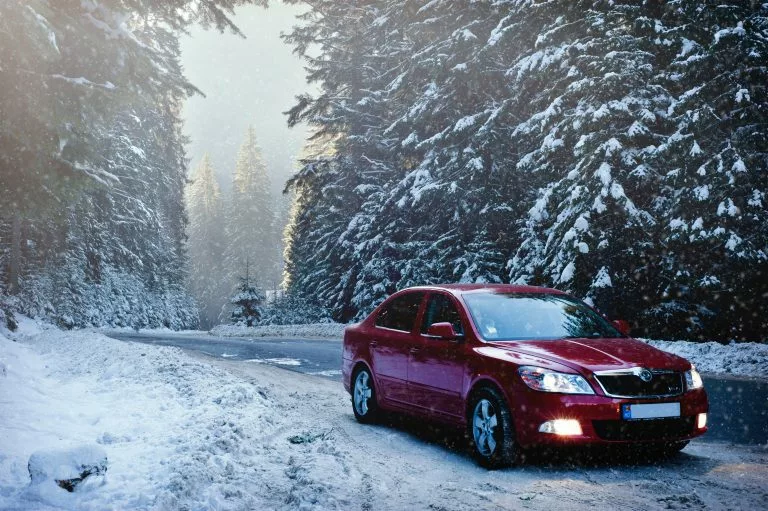 Winter is here with a bang and so are its dangers. While snowstorms may bring an abundance of beauty, they also bring an abundance of hazards: iced-over, slippery, or snowy roads, poor visibility, and broken-down vehicles all pose an extra threat during this magical time of year. As a result, 17% of all crashes occur during winter weather. Research done by AAA’s Foundation for Traffic Safety shows that, within the United States alone, nearly half a million crashes and 2,000 road deaths are caused every year by bad weather or poor road conditions. Being aware of these dangers and preparing properly for them can ensure your safety and the safety of your loved ones on the road.
Winter is here with a bang and so are its dangers. While snowstorms may bring an abundance of beauty, they also bring an abundance of hazards: iced-over, slippery, or snowy roads, poor visibility, and broken-down vehicles all pose an extra threat during this magical time of year. As a result, 17% of all crashes occur during winter weather. Research done by AAA’s Foundation for Traffic Safety shows that, within the United States alone, nearly half a million crashes and 2,000 road deaths are caused every year by bad weather or poor road conditions. Being aware of these dangers and preparing properly for them can ensure your safety and the safety of your loved ones on the road.
Winter driving dangers are in large part caused by terrible road conditions, poor visibility, and neglectful vehicle maintenance.
Terrible road conditions can be caused by one of three things: rain, snow, or ice. Rain can decrease visibility and cause hydroplaning, snow can make it difficult to accelerate and decelerate your car, and ice can be so thin it’s not even visible (black ice) and can make the roads extremely slippery. All 3 of these things can lead to accidents because they make it more difficult to stop, start, or turn your vehicle.
Poor visibility can be a side effect of awful road conditions or occur all on its own. A heavy snowfall or snow-covered roads can make it difficult to judge distances or see other vehicles and pedestrians that may be in your path. It’s easy to see how this could lead to a terrible accident.
Neglectful vehicle maintenance is a common problem during the winter. Neglecting to maintain your tires, oil filter, battery, wipers, and wiper fluid, and antifreeze can create a hazardous driving situation in winter weather. It’s especially important to make sure your vehicle is in good working order during these months since winter is much harsher towards your car.
Here some tips to keep you safe during winter driving:
● Ensure your car is up to date on maintenance and doesn’t need repairs before driving.
● Check your tires; proper inflation and good tread are essential for safe winter driving.
● Make sure your cell phone is charged and bring a fully charged portable power with you as well.
● Keep an ice scraper and brush in your car and clear all snow off the windshield, windows and headlights before driving.
● Do not drive above the speed limit. Drive at or below the speed limit to accommodate for road conditions.
● Increase the distance between yourself and other cars. Winter road conditions can increase the time it takes for your vehicle to decelerate.
● Keep cold-weather gear in your car. If your car breaks down, a blanket, hat and gloves, water, and food can quite literally save your life.
● Never let your gas tank fall below half full. This keeps your fuel line from freezing.
● Check your wiper blades to make sure they don’t need to be replaced and make sure to top off your wiper fluid. In rain and snow, you need wipers that work to be able to see.
● Have a car safety kit in your car with jumper cables, a flashlight with extra batteries, and a first-aid kit.
● Check the weather and if possible, delay your trip if the weather is treacherous.
● Avoid using cruise control.
● Avoid stopping unnecessarily. Snow can make it difficult for your car to start moving again, especially if you are going uphill.
● Consider buying snow tires if your car handles poorly in winter weather.
● Tell friends and family where you are going, what route you are taking, and when you expect to arrive. This can help your family find you if you get stranded.
Also, if you’re new to driving during the winter you may need some driving lessons. Learning how to handle a skid, how to adjust your driving speed for road conditions, how to stop on slippery roads, how to safeguard against black ice even when roads seem dry, and how to use your brakes properly in snow or ice are all extremely important in preventing an accident during the winter months.
Following these tips can help keep you and others safe when driving in the winter, but, unfortunately, car accidents will still happen. If you or someone you love has been injured or suffered a loss of life in a winter car crash due to someone else’s fault you should contact the experienced car accident attorneys at The Collins Law Firm as soon as possible. We can help you prove who was at fault and get you compensated for your injuries. Call us today at 630-527-1595 or fill out our contact form for a FREE EVALUATION of your car accident case.

"*" indicates required fields